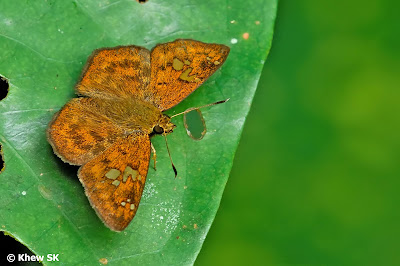The Fulvous Pied Flat (Pseudocoladenia dan dhyana)
A male Fulvous Pied Flat sunbathing on top of a leaf in the late afternoon
We kick start the Butterfly of the Month series with a species from the family Hesperiidae, or commonly referred to as Skippers. Skippers tend to fly rapidly and are often mistaken for moths. They have exceptionally large eyes and fat robust bodies. The sub-family Pyrginae, or Flats and Spread-Winged Skippers, is represented by 12 species from 8 genera in Singapore. Some are very rare and are classified Data Deficient in the latest Singapore Red Data Book, due to very few or very recent sightings and there is an element of doubt as to the species' existence in Singapore.
Our Butterfly of the Month for January 2024 is the Fulvous Pied Flat (Pseudocoladenia dan dhyana) a medium-sized species that was originally not recorded from Singapore in the early authors' reference checklists. It is hence deemed as a non-native or exotic species. However, after its discovery it has regularly been observed and hence appears to be naturalised with several colonies found in Singapore.
First spotted at the Bukit Timah Nature Reserve, the species is closely associated with forested habitats where its caterpillar host plant, Cyathula prostata (Amaranthaceae) grows in abundance. The plant is not difficult to cultivate, and where it is found, can be common. It is a low growing plant, usually seen as ground cover and spreads quite fast when it grows. The species is widely distributed, with colonies found at Upper Seletar Reservoir Park and at the forested areas beside Cleantech One in Nanyang Avenue in Jurong.
The common name of the Fulvous Pied Flat generally describes the species. Fulvous is an adjective that describes a dull yellowish-brown or tawny colour. Pied is an adjective that describes something that has two or more different colours usually in patches or spots. And being a member of the Pyrginae sub-family, it is a Flat that describes the behaviour of the species - usually perched with its wings spread open flat.
The Fulvous Pied Flat usually makes its appearance in the cool early hours of the morning. It can also be observed in the later part of the afternoon on hot sunny days, where it is seen to sunbathe on the top surfaces of leaves. During other times of the day, it tends to fly and perch on the undersides of leaves - a behaviour that is similar to many of the Pyrginae species.
The upperside of the Fulvous Pied Flat is reddish brown. The two large yellow hyaline spots at the end of the forewing cell, which are conjoined to form a distinctive V-shaped spot, distinguishes the male from the female of this species. In the female the spots are much reduced and appear whitish. There are other dark brown diffused spots on the fore and hindwings.
The full life history has been successfully recorded in Singapore on the caterpillar host plant Cyathula prostata. This plant has a wide distribution and can be found in Asia, Australia, Africa and tropical America. Parts of the plant are used as food and medicines for diarrhoea, dysentery, pain-relief etc. Locally, this plant can be found in waste places, forest margins and alongside trails in the northern and western catchment reserves. All early stages of the Fulvous Pied Flat feed on the leaf lamina of the host plant and retreat to their leaf shelters between feeds. Typically, they rest in a curled-up posture within the shelter.
Text by Khew SK : Photos by Ash Foo, Khew SK, Lee Yue Teng, Richard Ong, Michael Soh, Horace Tan and Alson Teo














Have been following this blog right since its inception. Phenomenal work. Keep it up!
ReplyDeleteThank you, Aniruddha for sticking with us for so many years, and for your kind words of encouragement!
ReplyDelete